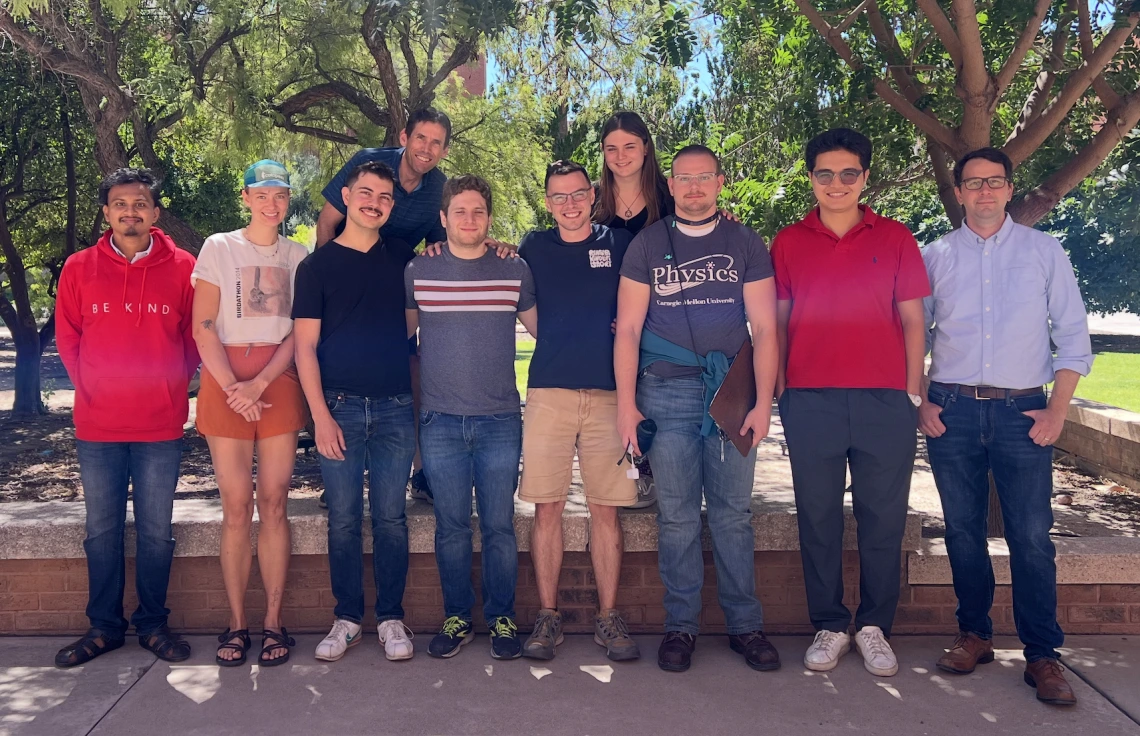University of Arizona physicist John Schaibley awarded Moore Foundation Grant to advance experimental quantum research

Dr. John Schaibley with Dr. Brian LeRoy and graduate students in the Schaibley and LeRoy Labs.
University of Arizona Associate Professor of Physics Dr. John Schaibley has been selected as part of the 2025 cohort of Experimental Physics Investigators by the Gordon and Betty Moore Foundation. The grant funding will support Schaibley’s pioneering work to manipulate the behavior of electrons in nanoscale materials—research that could enable breakthroughs in quantum computing and advanced electronics.

Prof. John Schaibley.
Schaibley, an experimental condensed matter physicist, specializes in quantum and optical effects in nanoscale semiconductors, including van der Waals materials and quantum dots. His group has made advances such as creating 2D semiconductor plasmonic modulators and demonstrating excitonic superfluidity in 2D heterostructures. With Moore Foundation support, his team will develop artificial crystal structures that allow researchers to engineer custom electronic states, including superconductivity and magnetism in systems where they do not naturally occur.
“In this project, we are going to develop new artificially patterned electronic systems that exhibit customizable quantum states of matter. I am extremely grateful to the Gordon and Betty Moore Foundation on the opportunity to pursue this research with my group,” said Schaibley.
The Experimental Physics Investigators Initiative recognizes mid-career researchers who are advancing the frontier of experimental physics. Schaibley is one of 22 new investigators named to the 2025 cohort, joining scientists from three previous groups. The program provides flexible, long-term support to accelerate breakthroughs and strengthen the experimental physics community.
“We once again received proposals from amazing mid-career investigators who are taking their research to new levels,” said Theodore Hodapp, program director for the initiative. “We are excited to see them join our existing cohorts of experimental physicists who are pushing the boundaries of our understanding of the universe.”
Beyond fundamental science, Schaibley’s research has the potential to address pressing societal needs. By enabling faster and more energy-efficient computing, it could reduce the energy footprint of modern technologies while powering advances in artificial intelligence, quantum computing, healthcare, and scientific discovery.
A faculty member at Arizona since 2016, Schaibley has been recognized with the AFOSR Young Investigator Award, the Science Foundation Arizona Bisgrove Scholar Award, and the Department of Physics Teaching Award. He received his Ph.D. from the University of Michigan and completed postdoctoral research at the University of Washington before joining the U of A faculty.
“Prof. Schaibley is pushing the boundaries of quantum research by unlocking the hidden potential of atomically thin materials,” said Dr. Shufang Su, Department Head of Physics at the University of Arizona. “His groundbreaking research into 2D semiconductors is paving the way for a new generation of quantum devices that could transform everything from computing to communications.”
To learn more about Dr. Schaibley and his research, click here.

